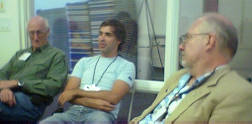SciBarCamp

Carolyn and I had a good time Friday and Saturday at SciBarCamp at the University of Toronto, but we blew off going today.
Yesterday, I attended a nice session on John Searle's classic "Chinese room paradox."
I also led a session on the World Wide Web gaining consciousness. One fellow, thinking he was above the rest of us, demanded of the fifteen or so people at my session, "How many of you have ever considered that consciousness might not really exist?" He expected us all to look blankly at him, and wait for him to enlighten us -- but, of course, every hand in the room went up. As I pointedly said to him, at a gathering like this it's not safe to assume that you are the smartest person in the room. :)
Later, the same guy tried to lecture my SF-writing colleague Dr. Peter Watts, saying "Let me explain evolution to you." Peter, of course, is a marine biologist, and knows the topic cold -- as he made quite clear to this fellow. :)
After that, science journalist Dan Falk moderated a panel on "What is time?" Panelists were fellow SF writer Karl Schroeder (one of the organizers of SciBarCamp), physicist Lee Smolin, and myself.
That's Lee and me pictured above. We were supposed to write our names and our interests on our name badges. Lee's says, "Lee" and the greek letter pi -- 'cause he works at the Perimeter Institute for Theoretical Physics, which is known as PI. I decided the simplest way to express what I was interested in was just to write "42" -- Douglas Adams's shorthand for life, the universe, and everything. :)
Carolyn gave a very good session (in the most beautiful room in the building) on science poetry (her session title: "What rhymes with neutrino?").
I have to say I preferred the way the original SciFooCamp organized its events (that blue T-shirt I'm wearing is my SciFooCamp shirt, by the way). There, they simply put a big timetable up on the wall, with room names and their capacities listed across the top and timeslots down the side. If you wanted to present, you picked a time and a room size, and wrote down what you wanted to do. It was fast -- every slot filled quickly. It was efficient -- you didn't end up getting counterprogrammed against something you wanted to see.
SciBarCamp adopted a much more elaborate system, in which people proposed topics in writing, others voted on them, and then the organizers after everyone had gone home for the day decided what would go when and where for the next day, and emailed out schedules. So, of course, silliness like having me scheduled (for the panel on time) opposite a discussion about the relationship between science and science fiction happened. And we ended up with huge blocks of time in which there was only one event; the other three programming rooms just sat vacant. I hope if there's a second SciBarCamp they'll use the SciFooCamp model for how to set up programming.
Not to grouse too much, but when the organizers take it upon themselves to schedule they become de facto responsible for maintaining that schedule, monitoring sessions and making sure they don't go overtime ... except they did this only sporadically. And so because of a combination of starting late (for no good reason that I could see) after lunch on Saturday, and then not keeping the events in synch, we ended up with a confusing mess of a schedule by Saturday afternoon. Again, a SciFooCamp-style self-organizing schedule makes all participants responsible for the timetable, and works better, especially when you're dealing with 10-minute and 20-minute programming blocks. Still, everyone had fun, and that's what counts. :)
Also, we'd been told that there were reservations at the Duke of York pub for after SciBarCamp wrapped for the day on Saturday ... and there were. But the programming ended at 5:00 p.m., and the reservation was at 8:00 p.m. People were suddenly told to go to dinner on their own and then return three hours later to the pub. That struck me and Carolyn as ... less that optimal ... since the Duke of York, of course, has full food service (incidentally, it's the pub that the character Lenore works at in my latest novel, Rollback). Rather than kill three hours, we headed back to Mississauga.
Still, the organizers deserve great credit for their initiative, and for getting a lot of really interesting people together on short notice. I had a good time, and would go to another such event.
(Photo: Physicist Lee Smolin, science-fiction writer Robert J. Sawyer)
The Robert J. Sawyer Web Site
Labels: SciBarCamp



